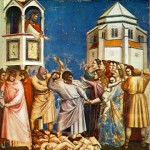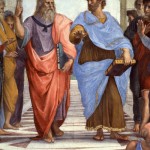Posts Tagged ‘Advent’
Massacre of the Innocents
Editor’s note: This was supposed to be published back in December, but due to a variety of reasons, publishing was put off and off until now.
 As we prepare for the second coming of Christ this Advent season, one of the events we must consider connected to Jesus’ first coming is the slaying of innocent children. Matthew 2:16-18 records what is called the “Massacre of the Innocents,” the genocide of all children age two and under in Bethlehem and the surrounding region by King Herod. Matthew records that this event fulfilled a prophesy made by Jeremiah:
As we prepare for the second coming of Christ this Advent season, one of the events we must consider connected to Jesus’ first coming is the slaying of innocent children. Matthew 2:16-18 records what is called the “Massacre of the Innocents,” the genocide of all children age two and under in Bethlehem and the surrounding region by King Herod. Matthew records that this event fulfilled a prophesy made by Jeremiah:
“A voice was heard in Ramah, weeping and loud lamentation, Rachel weeping for her children; she refused to be comforted, because they are no more” (Matthew 2:18, ESV).
Herod wanted to prevent Jesus from becoming King as had been prophesied. Two thousand years later, a small American community is also weeping because of the death of children during this Advent season. December 14, 2012 was a tragic day for the community of Newtown, Connecticut. Twenty children and eight adults were killed (including the shooter and his mother). Their deaths were evil.
In the midst of this tragedy, there are plenty of pundits stepping up to the microphone to use this as an opportunity for advancing various agendas and political platforms. Whether it’s liberal politicians endorsing gun control legislation or the Christian Right using this as an opportunity to scold the nation for a breakdown in morality and not allowing prayer in schools, Rachel is still weeping for her children. She still refuses to be comforted. But politicians don’t have answers or hope. Neither do Christian moralists.
But a little perspective is in order. Every day even more children are killed in the name of “a woman’s right to choose.” This murder will even be subsidized by American tax dollars. Not to mention the violence committed daily in many urban neighborhoods. We live in a culture of death.
In 1 Corinthians 15:26, St. Paul reminds us that “The last enemy to be destroyed is death.” All death is evil. It is our enemy. God did not create suffering. All death flies in the face of our Creator, who made us for life. The only answer to violence is love. No legislation will fix the problem. No amount of moralizing will address the root issue. The problem is sin. We can only prevent violence by freeing our hearts from it. Only love can free our hearts.
Even during this horrific tragedy, heroic acts of love were performed. The teachers who died trying to protect their students showed real love. John 15:13 tells us, “Greater love has no one than this, that someone lay down his life for his friends.” The ultimate act of love for all mankind was that of Jesus’ death for us.
But even His death was evil. In fact, it was the most evil death of them all. Death is a consequence of sin, but Jesus didn’t sin! He is the only one who didn’t deserve to die! Yet He chose to….
Jesus hated death. We know this because he ruined every funeral he ever attended. Death is not right. It’s not the way things are supposed to be. But Jesus died in order to defeat death. He trampled down death by death. And He rose from the dead. He is alive and death is dead. That is our comfort. It is the only comfort we have.
This Advent season we remember that when Christ comes again He will utterly destroy the last enemy: death. The grave cannot hold us. We will rise again in our bodies and live forever. Christ is risen!
Let us join in proclaiming the Paschal Troparion said every Pascha (Easter) in the Eastern Orthodox Church:
“Christ is risen from the dead, Trampling down death by death, And upon those in the tombs, Bestowing life!”
Peace of Jesus and Mary
The peace of Jesus is the peace of M ary
ary
as a piece of Mary would be the Person she’d carry.
For where would we be without her yes?
Still waiting for God to clean up our mess…
God chose her specific before all the ages
even though He didn’t say so on Biblical pages.
No one can deny that she must have been favored,
but there is some confusion about how hard she labored.
Was it hard for her to say yes to the messenger?
Does a healthy skepticism some how lessen her?
Or was it too simple, if she had no sin?
Was she playing a game in which she had no skin?
These questions and more are the basis for heresies.
But a simpler one came out of the Pharisees.
Who was her Son and why did He care for these,
littlest ones whom He made His inheritees
and how was He different from His parodies
and should we give to each of His charities?
Jesus to Mary was Son, Spouse and Brother
Creator and Redeemer (although undercover)
Mary to Jesus was most truly a mama
but who is better in the thickest drama?
And whose heart could have more love in it
than the one we compare to the ark of the covenant?
For Jesus, to all, is Priest Prophet and King
but Mary’s the quiet voice whom He heard sing.
He gave us sweet Mary for our mother each
so that her peace is not out of our reach.
For although troubles do come into our hearts
she says listen to Jesus and do then your parts.
So as Christmas comes, think a little of Mary,
and a little of Hanna and Sarah who carry
the promise of children that they’d love to have had
and gave them away without appearing sad.
But remember too, the childless and the barren
and this Christmas, let them know that you’re carin’.
The peace of Mary is the Joy that she had
the Joy to the World who makes all nations glad.
Merry Christmas everyone!
A tradition even Evangelicals anticipate
Many Protestants are proud of not having a liturgy, which smacks of tradition, the papacy, and salvation by works. But when it comes to Christmas, we all have traditions. My mother makes the same variety of cookies every year. My father always needs coffee (and us kids made orange juice), read the Christmas story in Luke, and forced us to take turns opening presents on Christmas morning1. We have Advent calendars, tree lightings, gift shopping trips, special meals, and so on that we feel compelled to attend to. For many Christians, Evangelical or not, the December holiday revolves around dozens of revered family, church, and cultural traditions. Most of us wouldn’t have it any other way.
Nearly every church I’ve been to in December celebrates the four weeks of Advent. I bet your church does too. But I wonder how many people know that the Advent tradition is observed by nearly all Christians? Even the Scripture readings are common between Catholics and most Protestants2. There’s something wonderful about the worldwide Church agreeing on something (anything) and our local church, at least, is trying to get on board with that.
If you went to church this week, there’s a really good chance the Old Testament reading was:
“Behold, the days are coming, declares the LORD, when I will fulfill the promise I made to the house of Israel and the house of Judah. In those days and at that time I will cause a righteous Branch to spring up for David, and he shall execute justice and righteousness in the land. In those days Judah will be saved, and Jerusalem will dwell securely. And this is the name by which it will be called: ‘The LORD is our righteousness.’—Jeremiah 33:14-16 (ESV)
As Christians, we believe that this promise was fulfilled by the birth of Jesus, a descendant of David. But when Jeremiah heard this word and spoke it, he was in Jerusalem as it was under siege by the Babylonian king, Nebuchadnezzar II, for the second time. Since after the time of Solomon, David’s son, the Kingdom of Israel had been split into two kingdoms. Then the Northern Kingdom was destroyed by the Assyrians and the Southern Kingdom was defeated by Babylon and a puppet government was established in Judah. God’s promise that a descendant of David would rule a united kingdom forever seemed, at that moment, as far away as could be possible.
In some ways prophets, such as Jeremiah, were ancient editorialists. They commented on the direction of the nation, influenced public opinion, and often disagreed with each other on partisan lines. Near the end of the Kingdom of Judah, there were two camps: those that predicted Babylon would be repulsed and the other that warned that God would allow them to purge the land of idolatry. Jeremiah and Ezekiel were the primary proponents of the later view.
We read Jeremiah’s despair over the destruction of Jerusalem in the book of Lamentations. Nearly his entire career was marked by pessimism over the future of his nation; the Lord required him to prophesy the inevitability of Babylon’s victory. When their armies surrounded the city of David, Jeremiah was imprisoned in palace of Judah on charges of defeatism. God had decided that Israel would be carried into a foreign city because the people would not turn from worshiping other gods. It must have been hard to have hope for the promised peaceful Davidic kingdom.
And yet, he did preach hope. For the next 600 years, Judah waited for the promised messiah. And even now, we wait for His return and the culmination of the promise with expectation and hope. This week of Advent is all about those layers of hope.
How far do you hope? We read in Revelation that God will bring together His Church from every ethnic group who will worship Him forever. As we look around at the brokenness of our culture and the division in our religion, it’s easy to assume that God will need to start over. In a lot of ways, the Protestant Reformation was founded on that assumption. It’s been 2,000 years since Jesus was born, lived, died, and rose again. Is it time to give up on His return?
Who do you put your hope in? Do you expect politics to solve the problems in society? Jeremiah opposed his government, but at the same time affirmed God’s promises that the line of David would one day establish peace. He was impatient with sin, but patient with God to deal with it3. God, unlike anyone else is always good. He always comes through, though not always at the time we expect.
In the coming weeks, we will see how God fulfilled His promise in His Son, Jesus. But we must recall that we are still, in some ways, like the Old Testament prophets: we are waiting with expectation for God’s next move.
Footnotes:


